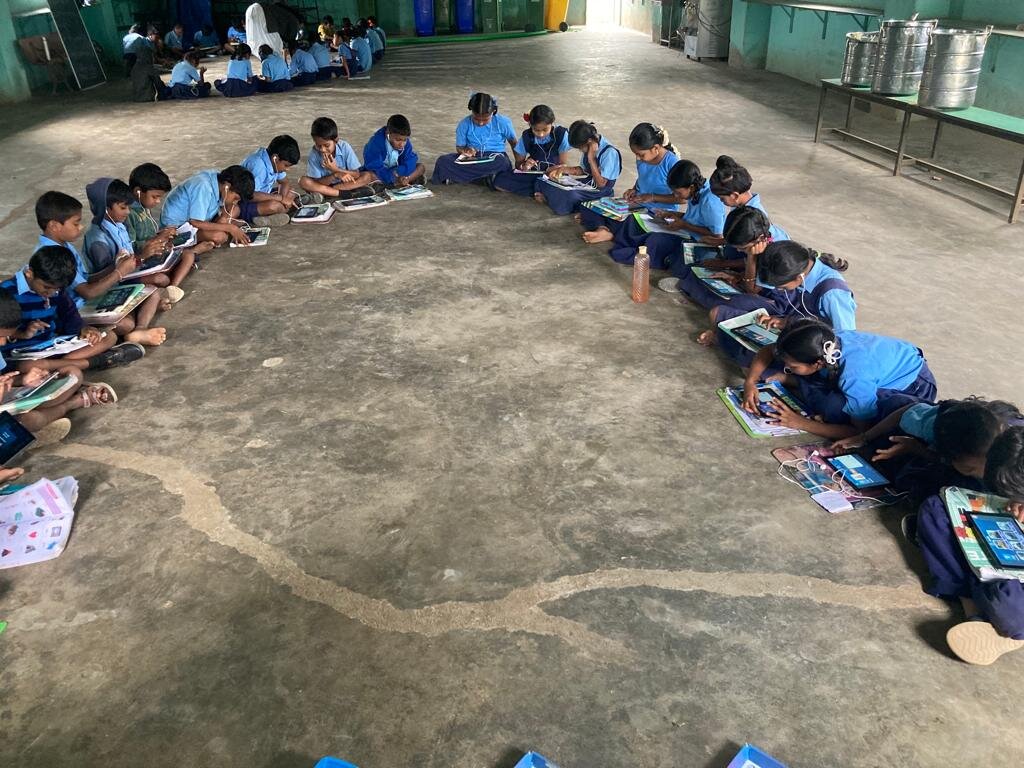By Sudha Upadhyayula | Chief Operating Officer
This year saw us continuing old and forging new partnerships to help us with tech-capability building across our school adoption, women’s skilling and field-based practices.
IA. For our School Adoption Program we continued our partnership with Indonesia-based SOLVE Education to bring in-classroom CEFR-based offline games that allow students to learn planning, budgeting and modeling a city all while learning to communicate better in English. This academic year also saw four of our students winning SOLVE Education’s Global Weekly Challenge among tens of thousands of participants from their partner schools across Indonesia, Malaysia, Singapore, Philippines, Thailand and India. Having learnt from our impact data, in the upcoming academic year, we aim to expand this program to 1500+ students, across 30+ schools through 20 teachers.
IB. This past year also saw us recognizing the constraints under which we are teaching a foreign language. We noted that:
1. Based on the current model of work at OBLF- each teacher gets to spend roughly 200 minutes on an average per week with each set of students.
2. Given their social backgrounds, our learners do not have exposure to or opportunities to learn or correct English Language outside these 200 minutes.
3. Due to large class sizes, it is often difcult for teachers to provide opportunities for independent learning.
In an attempt to solve this, we piloted an after-school WhatsApp-based English program that we call L.E.A.P (Learning English Through Accelerated Practice) in partnership with Glific. Glific is an open-source, WhatsApp based, two-way communication platform that has been developed underProject Tech4Devinitiative ofChintu Gudiya Foundation, by multiple Tech4Dev partners in India.
Taking our learnings from our month-long pilot forward, we aim to launch L.E.A.P 2.0 in July that will help us reach around 1000 students over the course of the academic year after school.
II. On the teacher training front, we worked on making the use of a learning management system, Edurigo, a habit among teachers, by releasing courses periodically in tandem with our offline training modules. This upcoming year, we are looking at diving deeper and making it an integral part of our training DNA by experimenting with more structured on-demand courses that will allow us to not only train our in-service teachers, but also orient in-coming pre-service teachers to our program and pedagogical approach.
III. For field operations, we have been able to integrate technology in two areas - tracking schools (reach and administrative locations), students (attendance, academic progress) and teachers (student attendance and time-table) in collaboration with DataOGram
- tracking and streamlining attendance and leave application process for our field-staff through a geo-fenced app created in collaboration with SocialBytes. This application has eased communication between our reporting and monitoring on-field staff around attendance, leave and punctuality by removing human-bias and laying a foundation for data-driven conversations.
Project reports on GlobalGiving are posted directly to globalgiving.org by Project Leaders as they are completed, generally every 3-4 months. To protect the integrity of these documents, GlobalGiving does not alter them; therefore you may find some language or formatting issues.
If you donate to this project or have donated to this project, you can receive an email when this project posts a report. You can also subscribe for reports without donating.
